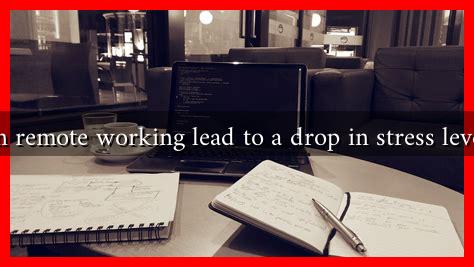-
Table of Contents
Can Remote Working Lead to a Drop in Stress Levels?
In recent years, remote working has transitioned from a niche arrangement to a mainstream practice, especially accelerated by the COVID-19 pandemic. As organizations adapt to this new normal, many employees are experiencing a shift in their work-life balance. One of the most significant questions arising from this shift is whether remote working can lead to a drop in stress levels. This article explores the various dimensions of remote work and its potential impact on employee stress.
The Stressors of Traditional Office Environments
Before delving into the benefits of remote work, it is essential to understand the stressors commonly associated with traditional office environments. These stressors can include:
- Commute: Long and stressful commutes can lead to fatigue and frustration.
- Office Politics: Navigating interpersonal relationships can create anxiety and tension.
- Distractions: Open office layouts can lead to constant interruptions, reducing productivity.
- Rigid Schedules: Fixed working hours can limit flexibility and personal time.
These factors contribute to a high-stress environment, which can negatively impact mental health and overall job satisfaction.
Benefits of Remote Working on Stress Reduction
Remote working offers several advantages that can contribute to lower stress levels. Here are some key benefits:
- Elimination of Commute: Working from home eliminates the daily commute, saving time and reducing stress associated with traffic and public transport.
- Flexible Work Hours: Remote work often allows for more flexible schedules, enabling employees to work during their most productive hours and manage personal responsibilities more effectively.
- Personalized Work Environment: Employees can create a workspace that suits their preferences, whether that means a quiet room or a cozy corner with plants.
- Improved Work-Life Balance: The ability to blend personal and professional life can lead to greater satisfaction and reduced stress.
Case Studies and Statistics
Several studies have highlighted the positive impact of remote work on stress levels. For instance, a survey conducted by Buffer in 2021 found that:
- Approximately 32% of remote workers reported improved work-life balance.
- Over 20% noted a decrease in stress levels due to the flexibility of remote work.
Additionally, a study published in the Journal of Occupational Health Psychology found that employees who worked remotely experienced lower levels of emotional exhaustion compared to their in-office counterparts. This suggests that the autonomy and flexibility associated with remote work can significantly reduce stress.
Challenges of Remote Work
While remote work has its benefits, it is not without challenges that can also contribute to stress. Some of these challenges include:
- Isolation: Remote workers may feel lonely or disconnected from their colleagues.
- Overworking: The blurring of boundaries between work and home life can lead to longer working hours and burnout.
- Communication Barriers: Lack of face-to-face interaction can lead to misunderstandings and feelings of disconnection.
Addressing these challenges is crucial for organizations to ensure that remote work remains a viable option for reducing stress.
Strategies for Reducing Stress in Remote Work
To maximize the benefits of remote work while minimizing its challenges, both employees and employers can adopt several strategies:
- Regular Check-ins: Schedule regular virtual meetings to maintain communication and connection among team members.
- Set Boundaries: Encourage employees to establish clear work hours and take regular breaks to avoid burnout.
- Promote Social Interaction: Organize virtual team-building activities to foster camaraderie and reduce feelings of isolation.
Conclusion
In conclusion, remote working has the potential to lead to a drop in stress levels for many employees by eliminating common stressors associated with traditional office environments. The flexibility, autonomy, and personalized workspaces that remote work offers can significantly enhance work-life balance and overall job satisfaction. However, it is essential to address the challenges that come with remote work to ensure that employees do not experience isolation or burnout. By implementing effective strategies, organizations can create a supportive remote work environment that promotes mental well-being and reduces stress.


